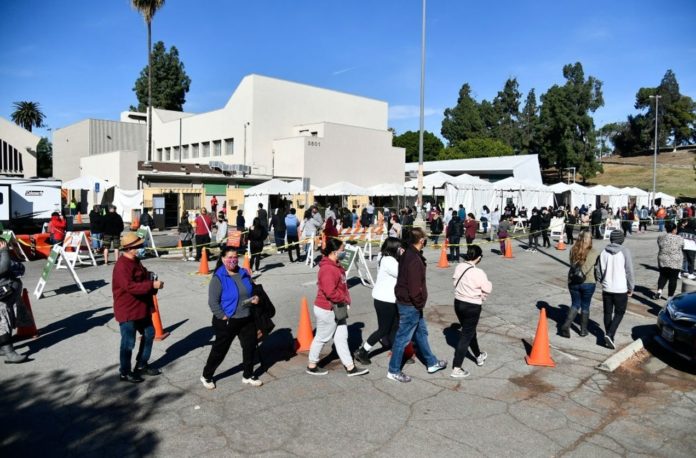Hospitals around the country are increasingly making the unusual decision to allow COVID-19-infected nurses and other professionals with little or no symptoms to continue working.
The decision was made in response to a staffing shortage in hospitals and the startling number of cases caused by the omicron COVID-19 variant.
Hospital employees who test positive but are asymptomatic can continue to work, according to California health officials. Employees at some hospitals in Rhode Island and Arizona have also been told that if they have no or really minor symptoms, they can continue to work.
The omicron strain has triggered more than 700,000 new COVID-19 cases every day in the United States, breaking the previous record set a year ago. The number of Americans hospitalized with the virus is hovering around 110,000, just shy of the peak of 124,000 in January of last year.
Many hospitals are not only overburdened with cases, but also face a staffing shortage as a result of COVID-19 infection among many employees.
It is believed that the omicron type is less severe than the delta variant, although being highly contagious.
The Centers for Disease Control and Prevention (CDC) announced last month that healthcare employees who do not have symptoms can return to work following a negative diagnostic test after seven days, but that the quarantine period can be cut further if there is a staffing shortage.
France also announced last week that health personnel with moderate or asymptomatic symptoms will be allowed to continue caring for patients rather than being isolated.
In the Phoenix metropolitan area, Dignity Health, a major hospital operator, released a note to employees suggesting that individuals who have been infected with the virus but are feeling well enough to work might ask their managers for permission to return to work to care for patients. The new criteria have not yet been applied at Dignity Health hospitals in California, but they may be required to do so in the coming days and weeks.
“We are doing everything we can to ensure our employees can safely return to work while protecting our patients and staff from the transmissibility of COVID-19,” Dignity Health said in a statement.
The new regulation was implemented in California due to “critical staff shortages,” according to the Department of Public Health. They urged hospitals to make every effort to overcome shortages in personnel by hiring from outside staffing agencies.
Infected personnel will also be required to wear additional N95 protective masks and will be assigned to care for other COVID-19 patients, according to the department.
“We did not ask for this guidance, and we don’t have any information on whether hospitals will adopt this approach or not,” said Jan Emerson-Shea, a spokesperson for the California Hospital Association. “But what we do know is that hospitals are expecting many more patients in the coming days than they’re going to be able to care for with the current resources.”
Many hospital personnel, according to Emerson-Shea, have been exposed to the virus and are either sick or caring for sick family members.
The California Nurses Association, which has 100,000 members, has spoken out against the move, warning that it may lead to more infections.
Gov. Gavin Newsom and other state health leaders “are putting the needs of health care corporations before the safety of patients and workers,” Cathy Kennedy, the association’s president, said in a statement. “We want to care for our patients and see them get better — not potentially infect them.”
A state psychiatric hospital and a rehabilitation center in Rhode Island allowed personnel who tested positive for COVID-19 but were asymptomatic to work earlier this month.
Dr. Hany Atallah, chief medical officer at Miami’s Jackson Memorial Hospital, said the hospital is not currently at capacity and that staff who test positive must leave for five days.
“We still have to be very careful to prevent spread in the hospital,” he said.
A nurse at Jackson Memorial, Kevin Cho Tipton, said he understands why hospitals want personnel to return after five days of quarantine. Nonetheless, he is concerned about the risk, particularly for patients who are at higher risk of infection, such as those who are receiving transplants.
“Yes, omicron is less deadly, but we still don’t know much,” he said.
Image Credit: Getty
You were reading: Staff with COVID-19 allowed work in US hospitals
